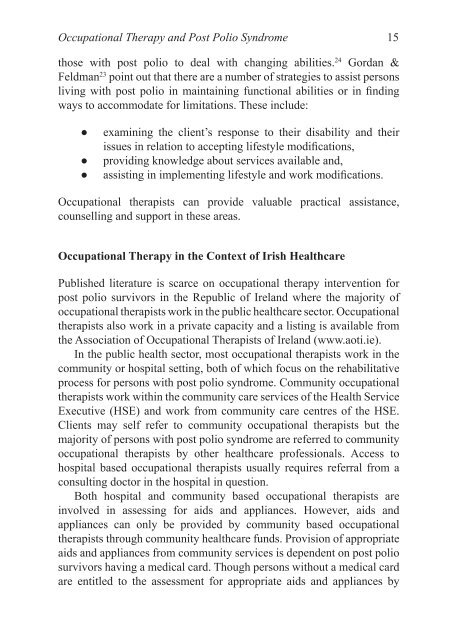Post Polio Syndrome - Management & Treatment in Primary
Post Polio Syndrome - Management & Treatment in Primary
Post Polio Syndrome - Management & Treatment in Primary
Create successful ePaper yourself
Turn your PDF publications into a flip-book with our unique Google optimized e-Paper software.
Occupational Therapy and <strong>Post</strong> <strong>Polio</strong> <strong>Syndrome</strong> 15<br />
those with post polio to deal with chang<strong>in</strong>g abilities. 24 Gordan &<br />
Feldman 23 po<strong>in</strong>t out that there are a number of strategies to assist persons<br />
liv<strong>in</strong>g with post polio <strong>in</strong> ma<strong>in</strong>ta<strong>in</strong><strong>in</strong>g functional abilities or <strong>in</strong> f<strong>in</strong>d<strong>in</strong>g<br />
ways to accommodate for limitations. These <strong>in</strong>clude:<br />
● exam<strong>in</strong><strong>in</strong>g the client’s response to their disability and their<br />
issues <strong>in</strong> relation to accept<strong>in</strong>g lifestyle modifications,<br />
● provid<strong>in</strong>g knowledge about services available and,<br />
● assist<strong>in</strong>g <strong>in</strong> implement<strong>in</strong>g lifestyle and work modifications.<br />
Occupational therapists can provide valuable practical assistance,<br />
counsell<strong>in</strong>g and support <strong>in</strong> these areas.<br />
Occupational Therapy <strong>in</strong> the Context of Irish Healthcare<br />
Published literature is scarce on occupational therapy <strong>in</strong>tervention for<br />
post polio survivors <strong>in</strong> the Republic of Ireland where the majority of<br />
occupational therapists work <strong>in</strong> the public healthcare sector. Occupational<br />
therapists also work <strong>in</strong> a private capacity and a list<strong>in</strong>g is available from<br />
the Association of Occupational Therapists of Ireland (www.aoti.ie).<br />
In the public health sector, most occupational therapists work <strong>in</strong> the<br />
community or hospital sett<strong>in</strong>g, both of which focus on the rehabilitative<br />
process for persons with post polio syndrome. Community occupational<br />
therapists work with<strong>in</strong> the community care services of the Health Service<br />
Executive (HSE) and work from community care centres of the HSE.<br />
Clients may self refer to community occupational therapists but the<br />
majority of persons with post polio syndrome are referred to community<br />
occupational therapists by other healthcare professionals. Access to<br />
hospital based occupational therapists usually requires referral from a<br />
consult<strong>in</strong>g doctor <strong>in</strong> the hospital <strong>in</strong> question.<br />
Both hospital and community based occupational therapists are<br />
<strong>in</strong>volved <strong>in</strong> assess<strong>in</strong>g for aids and appliances. However, aids and<br />
appliances can only be provided by community based occupational<br />
therapists through community healthcare funds. Provision of appropriate<br />
aids and appliances from community services is dependent on post polio<br />
survivors hav<strong>in</strong>g a medical card. Though persons without a medical card<br />
are entitled to the assessment for appropriate aids and appliances by<br />
PPS Mngt and Treat.<strong>in</strong>db 15 02/07/2007 16:07:49





